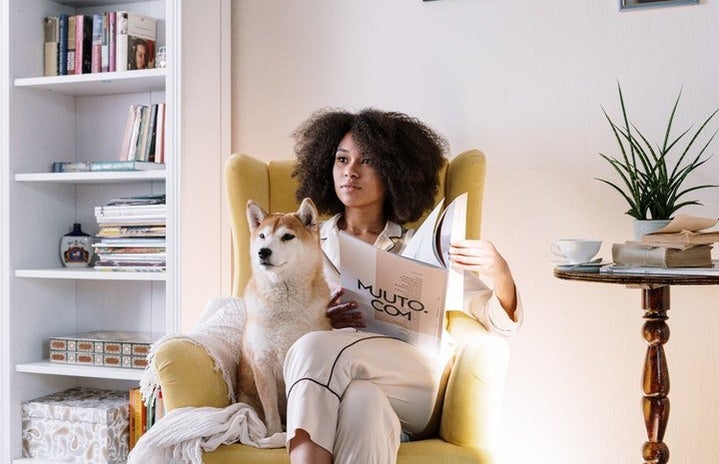For many people, becoming an adult and moving into your own place means finally getting the pet of your dreams. Maybe you spent your whole life with a family dog, and now no house is a home without a furry friend. Or maybe you always wanted a pup of your own, but you were never able to own one under your parents’ roof.
Regardless of your reasons, adopting a dog can be an exciting first foray into the world of adult responsibilities, and it’s incredibly important to properly prepare before going through with it. So using my personal experience and some information from articles, here’s a list of some of the most important things to consider when adopting a dog.
- Will you even have time for a dog?
-
Dogs require a lot of time. This may be common sense for anyone who has owned a dog before, but even then, if you weren’t the dog’s primary caretaker, you’re going to need to prepare for a whole new level of time dedication.
Regardless of the breed you choose, your dog is going to want to spend as much time with you as possible– they’re social animals, after all! And they didn’t earn the title of “man’s best friend” by sitting in houses alone. Therefore, before deciding to get a dog, you should try to figure out how you’ll budget your time. You should also note that dogs of different breeds and ages require different amounts of time spent with their owners.
- Can you even afford a dog?
-
So you’ve considered your time management, and have determined that there’s room in your busy life for a dog. But can you pay for that dog? And no, I don’t just mean the adoption fees. Dogs, like all pets, are not something you can simply pay for once.
Dogs require food, water, and stimulation (often in the form of toys). Dogs will also need to visit the vet from time to time, whether it be to get their shots, to mend an unexpected injury, or because they have fallen ill. You’ll also have to consider the cost of medication for fleas, ticks, or heartworms. And on top of all of this, you should make sure your dog is spayed or neutered. And these are just the necessities!
You’ll also probably buy a bed or crate. And depending on the breed, you may have to pay for regular grooming. Finally, if you aren’t able to train the dog on your own, or if you need someone to care for the dog while you work long hours away from home, you’ll need to pay for obedience training and dog walkers. All of this to say, there are a lot of expenses that come with dog ownership.
- Do you live in a dog-friendly environment?
-
So you’ve read the previous two considerations and still feel ready for a dog. Great! Here’s the next obstacle: will your dog be happy living in your current environment?
To answer this question, you should ask yourself whether or not the place you live has safe areas for your dog to walk and play. Are there plenty of dog-walking routes? Do you have a yard where your dog can run wild and play, or is there a park nearby that could serve the same purpose? Are there other dogs nearby, and if so, are they friendly and well-trained? Most importantly, if you live in an apartment or rental property, does your landlord even allow dogs?
If the answer to all of these questions is yes, then maybe you really can get a dog! In which case, it’s time for you to consider specifically which type of dog is right for you.
- Rescue Shelter or Breeder?
-
When considering which dog to adopt, all of the previous considerations come into play again. Different breeds and ages require different amounts of time spent with them, and they come with different expenses. For example, Happy Hound University, a dog training company, explains that “larger dogs will end up costing more once you calculate how much they eat and that heartworm and flea/tick medication are more expensive for large breeds.”
But beyond simply choosing a breed, you must also consider where you will adopt your dog from. Many choose to either adopt from a rescue shelter or from a reputable breeder. Each of these options have their pros and cons.
A reputable breeder can often guarantee their puppies’ health, limiting the chances of unexpected genetic diseases appearing later in the dog’s life. Some may even start the training and socialization processes for you. However, breeders can be very expensive. Additionally, breeders sell puppies, not dogs. So if you can’t care for a puppy, you may need to opt for a shelter.
Rescue shelters sell dogs of all breeds, ages, and backgrounds, and adopting a rescue dog may save its life. A good shelter also screens its dogs as much as possible before putting them up for adoption, and may even work on training or socialization while they are in their care. However, purebreds are hard to find in shelters, as shelters usually can’t guarantee a dog’s lineage. This means adopting a shelter dog, especially a puppy, can be quite a gamble.
Perhaps the biggest downfall of shelters is that rescue dogs can come with trauma. According to rescuedogs101.com, “Some rescue dogs indeed have separation anxiety, resource guarding, [or] potty accidents,” as a result of being passed between houses and shelters. Luckily though, a rescue shelter’s goal is to place as many dogs in happy homes as possible, so it may be cheaper to adopt from a shelter than from a breeder.
- Future considerations
-
Dogs live a long time! According to petfinder.com, a website for matching potential owners with pets up for adoption, adopting a dog is “a 10 – 15 year commitment to [a] sentient being in sickness and in health, for richer and for poorer, for as long as all shall live.” Will you be able to own and care for a dog for that entire time?
You should consider the ways your own lifestyle may change in 10-15 years. Will you move? Get married? Have kids? Get a new job? Adopt additional pets? All of these changes could affect your dog, should you choose to adopt one.
You should also consider how older dogs need special care too, just like puppies. They may need more frequent trips to the vet, they may need bathroom breaks more often, or they may develop dietary restrictions.
If you’re not sure that you will be able to continue caring for a dog in ten years, then you may need to consider adopting a dog that is already mature or elderly, rather than adopting a puppy. Or perhaps you’ll just have to wait until you’ve settled into a more stable stage of your life.
As you can see, adopting a dog comes with a lot of potentially unforeseen responsibilities, consequences, and costs. And this list doesn’t even touch on every single one of them! Although adopting a dog can end up being one of the best choices in the world, there are many things you should consider before adopting, and the above list is only the ones I feel are most important.
Adopting a dog is a big decision to make, so give it the amount of careful thought that it deserves. And if, after all of this, you decide you still want to and can adopt a dog, then I wish you all the best!





